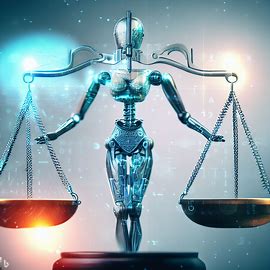AI and the Transforming Legal Field: How it Could Help, or Hurt
 Have you wondered what the legal field would be like if attorneys could access any legal information they need with a quick voice command, draft flawless and complicated contracts in minutes, review thousands of pages of documents in seconds, predict the outcomes of legal cases accurately, and provide affordable and accessible legal services to anyone in need? Sounding a little too good to be true? Well, this world is not as far away as you may think, thanks to artificial intelligence (AI).
Have you wondered what the legal field would be like if attorneys could access any legal information they need with a quick voice command, draft flawless and complicated contracts in minutes, review thousands of pages of documents in seconds, predict the outcomes of legal cases accurately, and provide affordable and accessible legal services to anyone in need? Sounding a little too good to be true? Well, this world is not as far away as you may think, thanks to artificial intelligence (AI).
AI is the term used to describe how computers can perform tasks normally viewed as requiring human intelligence, such as recognizing speech and objects, making real-time decisions based on data, translating languages, and creating original images. AI already has begun to have a significant impact on various fields and industries, including the legal profession.
AI can help lawyers and legal professionals with various tasks, such as legal research, contract review, document drafting, due diligence, e-discovery, and predictive analytics. For example:
- Legal research: Generative AI tools can expedite legal research by rapidly searching for and analyzing relevant case law, legislation, and secondary sources, which enables legal professionals to find pertinent information with ease. One such tool is ROSS Intelligence, which uses natural language processing to answer legal questions and provide citations. ROSS can read over a million pages of law in a second, finding the exact passages an attorney needs.
- Contract review: AI tools can review contracts to identify important clauses, flag potential issues, and suggest revisions based on best practices, simplifying the negotiation process, and reducing the risk of disputes. One such tool is LawGeex, which uses machine learning to analyze contracts and compare them to predefined policies.
- Document drafting: Generative AI can assist in drafting legal documents such as contracts, wills, and pleadings, by using pre-defined templates and input data. It also can help review existing documents for errors, inconsistencies, or potential legal issues. One example of this is the AI engine Luminance, which uses deep learning to understand the structure and content of documents and highlight anomalies. Luminance can draft documents in multiple languages and jurisdictions.
- Due diligence: In corporate transactions, generative AI can help automate the process of reviewing large volumes of documents, identifying potential legal risks and issues, and generating due diligence reports. One such tool is Kira Systems, which uses machine learning to extract relevant information from contracts and other documents. Kira Systems can reduce the time spent on due diligence by up to 90%.
- E-discovery: AI tools can help lawyers find relevant documents and evidence from large collections of electronic data, such as emails, social media posts, or text messages. One such tool is RelativityOne, which uses machine learning to organize, thread, batch, and search for relevant information in e-discovery projects. RelativityOne can handle complex data types and formats.
- Predictive analytics: AI tools can help lawyers predict the outcomes of legal cases based on historical data and trends. One such tool is Lex Machina, which uses natural language processing and machine learning to provide insights into case strategies, win rates, damages awards, and settlement amounts. Lex Machina perhaps can help lawyers gain a competitive edge in litigation.

AI also may be able to help help improve the quality of legal services and increase individual access to justice by reducing costs, increasing efficiency, enhancing accuracy, and providing insights that are undetectable to the human eye. For example:
- Reducing costs: AI tools may be able to help lawyers automate repetitive and time-consuming tasks that otherwise would require human labor and resources. This can lower the costs of legal services for both lawyers and clients. For instance, a study by LawGeex found that its AI program could save lawyers 80% of their time and reduce their costs by 90%.
- Increasing efficiency: AI tools may be able to help lawyers streamline their workflows and processes by providing faster and easier access to relevant information and insights. This can improve their productivity and performance. For instance, a study by Bloomberg Law found that its AI tool Brief Analyzer could reduce the time spent on legal research by 25%.
- Enhancing accuracy: AI tools may be able to help lawyers avoid errors and mistakes that may result from human bias or fatigue. This can improve the quality and reliability of their work. For instance, a study by LexisNexis found that its AI tool Lexis Answers could provide more accurate answers to legal questions than traditional keyword searches.
- Providing insights: AI tools may be able to help lawyers discover new patterns and relationships that may not be obvious or visible to the human eye. This can provide them with valuable insights that can inform their strategies and decisions. For instance, a study by Lex Machina found that its AI tool Legal Analytics could provide insights into judges’ behavior and preferences that could influence case outcomes.
However, AI also poses challenges and ethical concerns for the legal field. For example, AI may raise questions about liability, accountability, transparency, bias, privacy, security, and quality control. For example:
- Liability: Who is responsible if an AI tool makes a mistake or causes harm? Is it the lawyer who used the tool, the developer who created the tool, or the tool itself? How can the damage be measured and compensated?
- Accountability: How can lawyers ensure that they are complying with their professional obligations and ethical duties when using AI tools? How can they supervise and oversee the work done by AI tools? How can they explain and justify their decisions based on AI tools?
- Transparency: How can lawyers ensure that they understand how AI tools work and what data they use? How can they verify the accuracy and validity of the results produced by AI tools? How can they disclose and communicate their use of AI tools to their clients and other parties?
- Bias: How can lawyers ensure that AI tools are not influenced by human prejudices or stereotypes that may affect their outcomes? How can they detect and correct any potential biases in the data or algorithms used by AI tools?
- Privacy: How can lawyers protect the confidentiality and security of the data they use or generate with AI tools? How can they comply with the relevant laws and regulations regarding data protection and privacy?
- Security: How can lawyers prevent unauthorized access or misuse of their AI tools or data? How can they safeguard their AI tools or data from cyberattacks or malicious interference?
- Quality control: How can lawyers ensure that their AI tools are reliable and consistent in their performance? How can they monitor and evaluate the quality and effectiveness of their AI tools?
These questions require careful consideration and guidance from legal experts, regulators, and policymakers. Lawyers also must be aware of the existing laws and standards that may apply to their use of AI tools, such as the General Data Protection Regulation (GDPR) in Europe or the American Bar Association (ABA) Model Rules of Professional Conduct in the United States.
AI should not be viewed as a threat to the legal profession, but rather, an opportunity to enhance it. AI can augment human capabilities and enable lawyers to focus on more creative, strategic, and complex aspects of their work. However, AI cannot replace human judgment, intuition, empathy, and ethics essential for the practice of law as well. Ultimately, lawyers should embrace AI as a tool that can help them deliver better legal services within their practice, while maintaining their indispensable human role in the legal field.
We at the Herd Law Firm, PLLC, utilize technology and innovation like this to fight for victims of injuries of all kinds in all types of personal injury and death claims, and never waver in our commitment to help these victims and their families in seeking the assistance and compensation they so need and deserve.
Sources:
How Artificial Intelligence is Used in Legal Practice | Bloomberg Law. (2021). Retrieved 28 April 2023, from https://pro.bloomberglaw.com/brief/ai-in-legal-practice-explained/
Donahue, L. (2018). A Primer on Using Artificial Intelligence in the Legal Profession – Harvard Journal of Law & Technology. Retrieved 28 April 2023, from https://jolt.law.harvard.edu/digest/a-primer-on-using-artificial-intelligence-in-the-legal-profession
Kowalski, J. (2020). Artificial Intelligence in the Legal Field and the Indispensable Human Element. Georgetown Journal of Legal Ethics, 33(4), 1089-1116.
Three Ways Law Firms Can Use Artificial Intelligence | Legaltech News. (2019). Retrieved 28 April 2023, from https://www.law.com/legaltechnews/2019/02/three-ways-law-firms-can-use-artificial-intelligence/
Why Legal Professionals Must Adapt to AI or Risk Being Left Behind | Entrepreneur. (2021). Retrieved 28 April 2023, from https://www.entrepreneur.com/science-technology/why-legal-professionals-must-adapt-to-ai-or-risk-being-left/441751
Using Artificial Intelligence to Improve Law Firm Performance | Law Technology Today. (2021). Retrieved 28 April 2023, from https://www.lawtechnologytoday.org/2021/02/using-artificial-intelligence-to-improve-law-firm-performance/legal-professionals-must-adapt-to-ai-or-risk-being-left/441751
Using Artificial Intelligence to Improve Law Firm Performance | Law Technology Today. (2021). Retrieved 28 April 2023, from https://www.lawtechnologytoday.org/2021/02/using-artificial-intelligence-to-improve-law-firm-performance/







